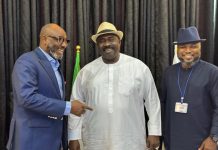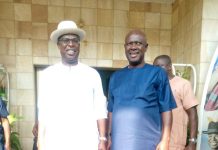By Bankole Lawanson
If one should ask who owns NNPC Ltd, formerly Nigerian National Petroleum Corporation (NNPC)? Many may just respond that it’s government or by Nigerians without deeply think about what it means.
In reality, NNPC Ltd is owned 100% and controlled by the Federal Government of Nigeria, with the President of Nigeria serving as the Minister of Petroleum Resources. But Nigeria has not gotten to a state where people see government managed institutions as theirs, more so when a wide gulf exists between the governed and the government.
With NNPC responsible for 60-70% of Nigeria’s annual revenue due to heavy reliant on oil exports, one can understand why the entity is always in the eye of the stormy. With resentment by many, accusations from social crusaders and probe upon probe by the lawmakers over revenue shortage, fuel scarcity among others, it will seem to make an economic sense for the NNPC management to maintain a functioning office at the National Assembly for their boss to attend to the unlimited summoning by the lawmakers every time.
With suspicion and and unending accusations by it’s public, the greatest battle the NNPC will love to win is to convince its owners that they own it. There is a way ownership brings about sense of responsibilities such as Maintenance and upkeep- ensuring the property or asset is in good condition; Financial obligations- paying taxes, insurance, and other expenses associated with the ownership; Liability- being accountable for any damages or injuries caused by the property or asset; Security- ensuring the property or asset is secure and protected from theft or damage; Compliance- adhering to laws and regulations related to the ownership; Stewardship- managing the property or asset in a responsible and sustainable way; Accountability- being transparent and answerable for the property or asset’s use and management; Risk management- mitigating potential risks associated with the ownership; Decision-making- making informed decisions about the property or asset’s use, management, and disposal; Reporting- providing accurate information about the property or asset’s performance, finances, and other relevant details.
When the Former Group Managing Directors (GMDs) of NNPC rose from their GMDs at the CEO Forum in July to express unwavering support for the current leadership, being the first to implement the Petroleum Industry Act (PIA), they noted in their communique that there is limited information in the public domain on NNPC’s operations since the transition to a private commercial entity.
Even though the former GMDs were more guilty of hoarding information about the organisisation than the present, their point is valid as there cannot be too much disclosure, as it could be the main weapon needed to win over Nigerians that the entity belongs to them, as reporting entails providing accurate information about the property or asset’s performance, finances, and other relevant details.
The current communications desk of the NNPC has been busy trying to catch up with unending demand for facts in the age of social media when the line between information and disinformation is very thin. Recent information about NNPC’s 2023 Audited Financial Statement with a net profit of N3.297 trillion would reassure the public that it’s no longer a loss making machine, so also will the information about its community-focused healthcare outreach tagged Vision First Programme, and the NNPC Foundation’s business pitching assessment training for corps members will ginger a sense of belonging.
It cannot be unnoticed how the Chief Corporate Communications Officer, NNPC Ltd, Olufemi Soneye recently took time to reply a national business newspaper on it’s editorial entitled: NNPCL: Liability or Asset to Nigerians?
While he pushed back on the newspaper’s insinuation that NNPC Ltd.’s asset is undercut by the opacity of its operations and corruption, as a regurgitation of age-long allegations that have since been overtaken by the emergence of Mr. Mele Kyari as the Group CEO of the company and the transition of the old NNPC as a corporation into a limited liability company under the Petroleum Industry Act, he further tried to set the record straight that “a bulk of the legacy problems, such as the age-long lack of maintenance of the refineries, is traceable to government interference.”
He added that “Any old refinery staff member of the NNPC Ltd will tell you that NNPC engineers used to carry out the turn-around maintenance of the refineries until past governments started dabbling in to influence contracts for their cronies.”
However, one thing is for the NNPC Ltd to have known targets to reply, it’s another ball game to take on faceless critics on the streets, social media and homes at this critical time when people are genuinely suffering and agitated while trying to make sense out of the reality that even the coming on stream of the long awaited Dangote Refinery will not immediately translate to cheap fuel.
The Dangote Refinery owner may have set the tone on things to come, a narrative which the NNPC will love to adopt, that the latest fuel price hike may be the last as the locally refined fuel will significantly reduce fuel imports, saving foreign exchange, contribute to stabilising the naira, lowering inflation, and reducing the cost of living; will boost the industrial and manufacturing sectors; Naira for Crude and Naira for Products will bring much-needed stability to the Naira by reducing the demand for dollars in the market by 40%.
However, beyond communicating the activities of the NNPC, the sense of ownership will be more enhanced if the people can approach it and even get their children to work there on merit. This is why the current well publicised recruitment exercise by the NNPC is commendable. Until now, it’s doubtful whether Nigerians from any part of the country could just apply for and get jobs at the NNPC when it was only the politicians and other well connected ones that fixed their children to work there year in year out. The organisation will do itself a great service if it can ensure the transparency and success of the ongoing recruitment exercise and ensure that the future ones follow the same pattern.
*Bankole Lawanson is a public Relations Analyst based in Abuja.



























